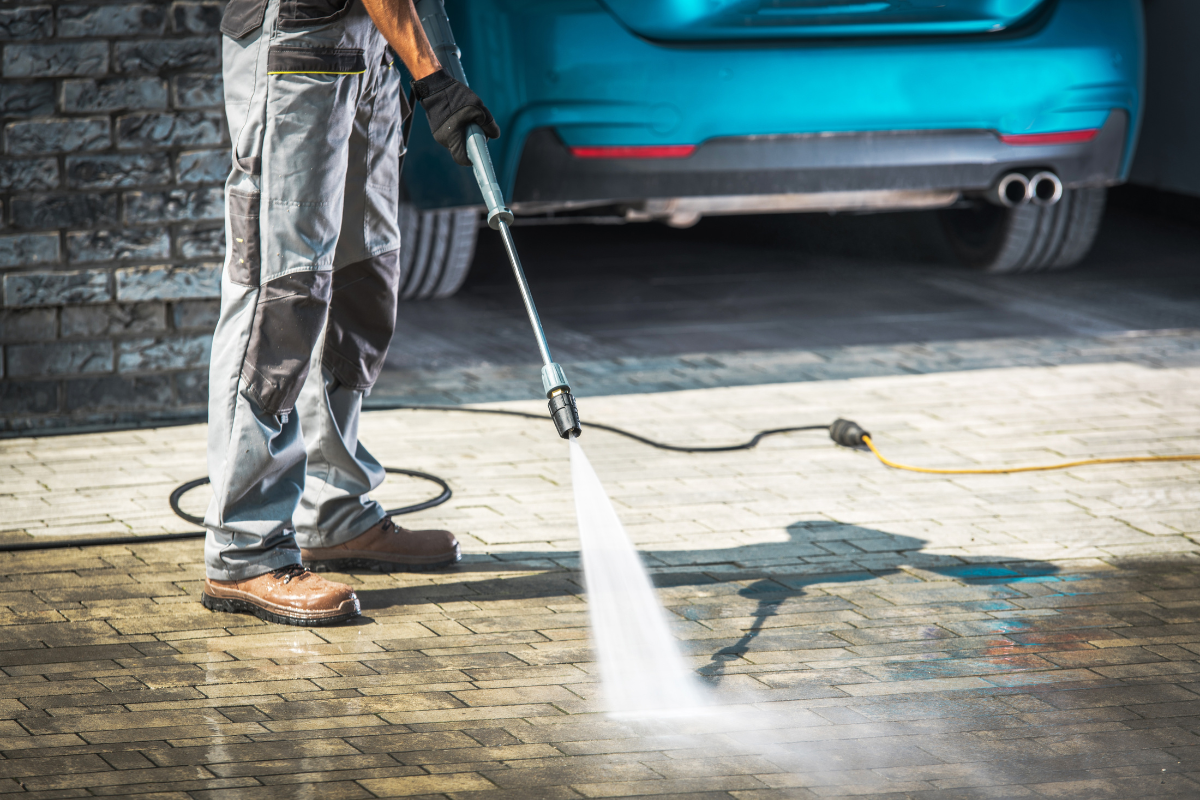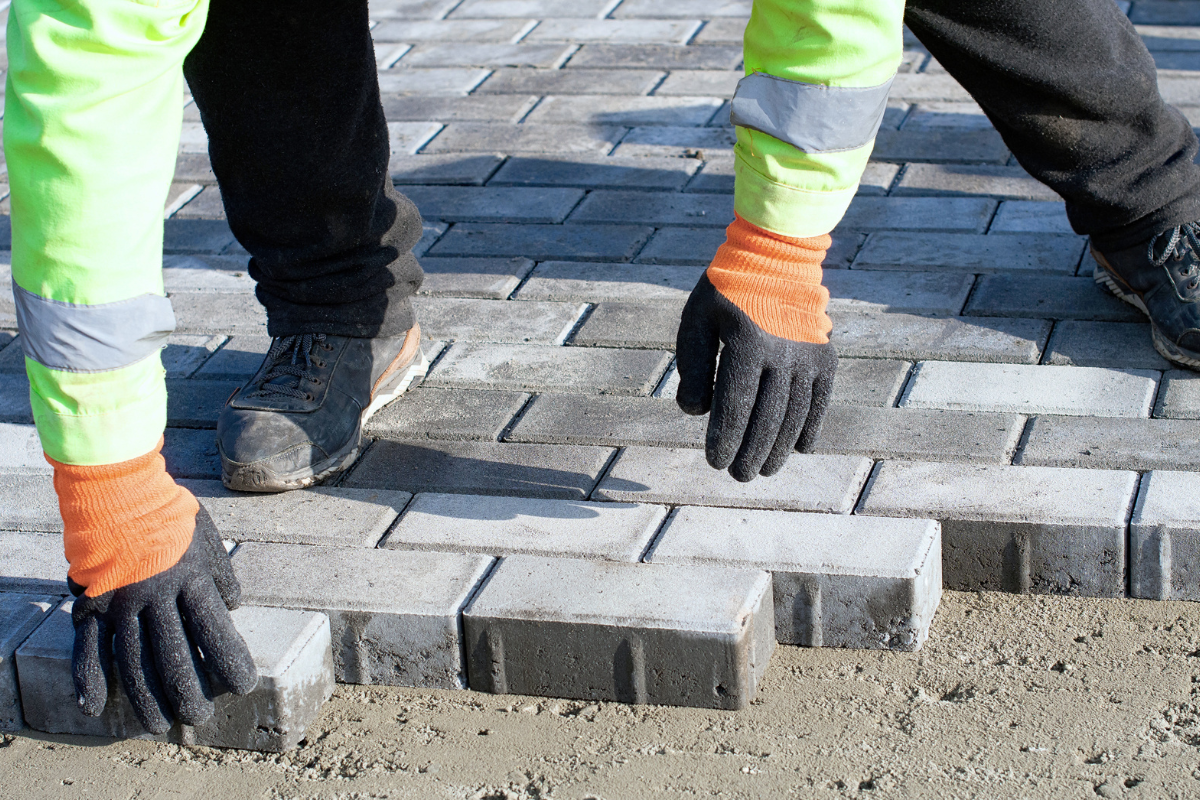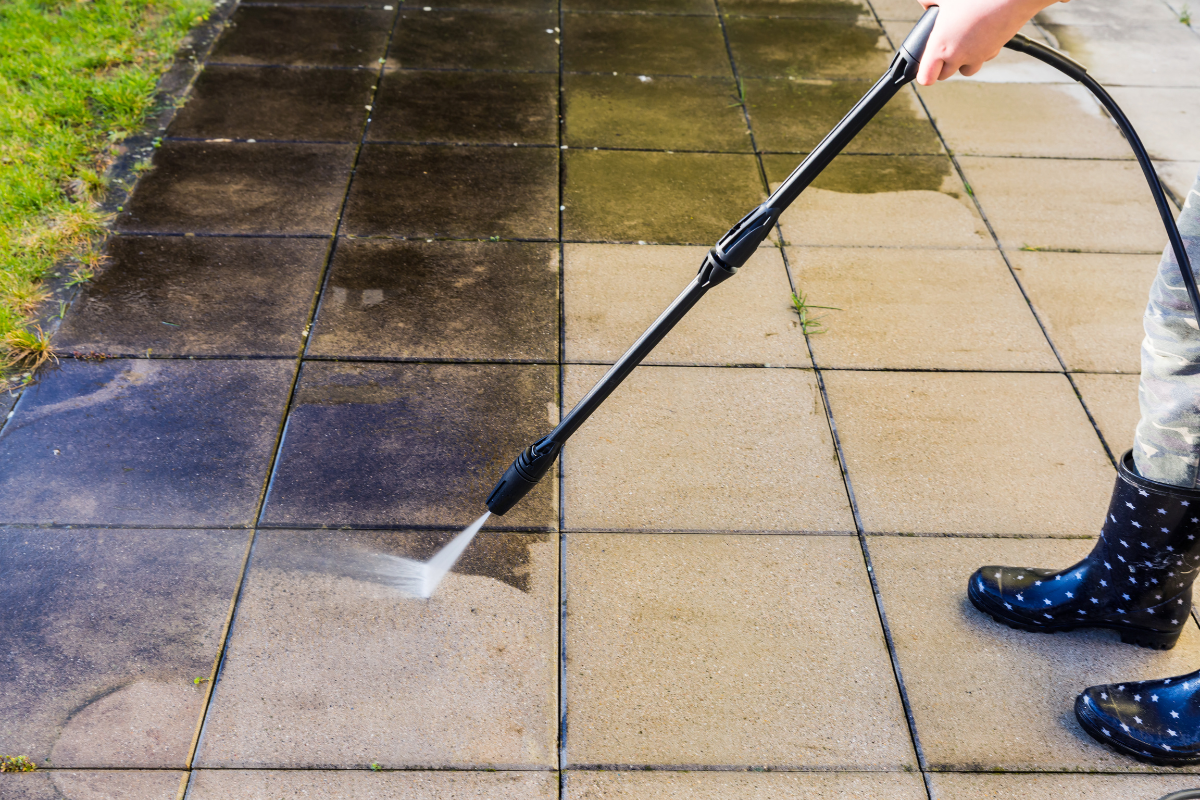
Pressure Washing Service: Why Professional Equipment Matters



Most surfaces look invincible until you point a pressure wand at them. Then the truth shows up fast. Concrete bleeds efflorescence, vinyl buckles, paint feather-edges, and pavers begin to wobble if sand is blasted out from the joints. The difference between a surface that looks newly installed and one that looks scarred often comes down to the equipment in the truck and the judgment of the tech holding the gun.
I have walked onto jobs where a homeowner rented a big-box machine, did two passes on the driveway, and ended up with tiger stripes that wouldn’t blend without a full re-clean. I have also seen do-it-yourself attempts at paver cleaning in Lutz turn a peaceful Saturday into a long week of replacing polymeric sand and chasing haze. This work is approachable, but it’s not casual. A professional pressure washing service brings more than PSI. It brings controlled flow, measured heat, specialized nozzles, surface cleaners that glide evenly, and a system for pre-treating and rinsing so the chemistry does the heavy lifting and the water just moves the residue.
The real variables behind a clean, safe wash
Water pressure by itself is a blunt instrument. In practice, four variables interact: pressure, flow, temperature, and chemistry. When a contractor says they “soft wash,” they’re not being vague. They’re telling you they let detergents and dwell time handle the breakup of organics, then use low pressure to rinse. When they talk about hot water, they’re pointing to the ability to shear off oils and gum at lower PSI. Flow rate, measured in gallons per minute, determines how quickly you can flush debris and keep a surface from re-depositing grime down the path you already cleaned.
A typical rental machine might deliver 2 to 2.5 GPM at 2,600 to 3,000 PSI. That will brighten concrete if you have patience, but it tends to leave stripes and does little against algae trapped in pores. Professional rigs push 4 to 8 GPM with adjustable pressure. At 4 GPM, a 20-inch surface cleaner can keep the Brick paver sealing Lutz FL nozzles spinning evenly, so every pass lays down a uniform finish. Up at 8 GPM, a tech can rinse an entire driveway without water starved streaks and can move silt toward the street without constantly stopping to unclog tips.
Temperature changes everything. A burner that raises water to 180 degrees will loosen oils and binders that cold water only smears. When you see gum pop off a sidewalk with a quick pass, that is heat doing the work, not brute force. Hot water also accelerates detergent action. You can cut dwell time by a third, sometimes half, without raising the risk of surface damage.
Chemistry is the quiet partner. Alkaline cleaners lift organics and atmospheric grime. Oxalic and citric acids reduce rust and orange battery stains from golf carts. Sodium percarbonate brightens wood safely when used correctly. Bleach, diluted and buffered, kills algae down to the root. None of these require high pressure when the dilution is right and the dwell is respected. Pros carry dedicated sprayers with metering valves, so they don’t guess.
Why you want controlled equipment around pavers
Pavers look rugged but hide a delicate balance between the stones, the bedding sand, and the jointing material. The easiest way to ruin that balance is to blast out the joints with a wand tilted at the wrong angle. The right approach for paver cleaning in Lutz or any humid Gulf Coast market starts with understanding what lives on and inside the pavers. Algae, mildew, and sugar gum are common. Ants love to displace joint sand. If you plan to apply a paver sealer afterward, every contaminant has to go, but the substrate must remain intact.
A professional will pre-treat with an algaecide or bleach-based cleaner, let it work, then use a surface cleaner at a conservative pressure, usually 1,200 to 1,800 PSI at the deck, not the pump. They’ll keep the deck moving to avoid etching. Edges get rinsed with a fan tip, not a zero-degree nozzle. After the wash, the joints are inspected. If sand is low, new polymeric sand is swept and vibrated into place with a plate compactor, not just broomed. Only when the joints are properly filled and the surface is dry do they seal.
That sequence matters. If you search for paver sealing near me, you’ll find an array of offers, some too cheap to be serious. The cost difference often tracks with equipment, sand compaction, and the quality of the paver sealer. A good sealer penetrates to lock in joint sand and resist UV without glazing the surface. Gloss levels range from natural matte to wet-look. The decision isn’t just aesthetic. Glossy film-formers can trap moisture and turn milky in Florida humidity if applied too thick or on a damp surface. Penetrating sealers breathe, but they may not deliver the deeper color pop some homeowners want. An experienced crew tests a small, inconspicuous section, especially with porous travertine and tumbled pavers that drink unevenly.
Driveways, sidewalks, and the myth of “more PSI”
The most common request I hear, often after a frustrating Saturday with a rental unit, is for “more pressure.” The issue isn’t pressure. It’s evenness, rinse volume, and technique. A driveway cleaned with a 20-inch surface cleaner at 4 to 5 GPM will look uniform, even under low-angle sunlight. The same driveway striped with a wand will show every arc and pivot. Professional surface cleaners float on a controlled hover as twin or triple nozzles spin inside a shroud. The shroud contains overspray and keeps debris from dotting a garage door or stucco wall. After the deck pass, a high-volume rinse sweeps grit away so it doesn’t settle back into pores.
If you’ve ever typed driveway pressure washing near me and wondered why quotes differ, ask what equipment they bring and whether hot water is available. On driveways with automotive oil or tire marks, heat and a degreaser cut the work in half. On shaded concrete that’s greened over, a soft wash pre-treat makes everything smoother. The rinse becomes housekeeping instead of warfare.
Where soft washing beats blasting
Vinyl siding doesn’t like high pressure. Neither do window seals, lap siding, soffits, and many types of stucco. Water intrusion creates problems you won’t notice until the next rain or the next utility bill. Soft washing uses low pressure, often below 300 PSI, combined with detergents that suspend dirt and kill organic growth. Think garden-hose force, not paint-peeler. The results can be dramatic with almost no mechanical abrasion.
A properly set up pressure washing service will carry a dedicated soft wash pump, separate chemical tanks, and custom-blended surfactants that help the solution cling. They might add a mild scent mask to neutralize the bleach smell near entryways. They will protect plants by pre-wetting and post-rinsing, and they will control runoff so it doesn’t bleach mulch or etch aluminum. That level of control is hard to achieve with a single all-purpose machine and a hope that a nozzle change will save the day.
The staging that keeps a job clean and quick
Speed comes from organization more than horsepower. On a typical residential job, the crew stages in a sequence that reduces backtracking and minimizes airborne splash:
- Walk the property, note fragile items, check exterior outlets, and confirm water access. Photograph pre-existing stains or cracks.
- Pre-wet plants and cover sensitive hardware. Mix detergents for the day’s surfaces and label them.
- Pre-treat the worst areas first, let dwell, then run the surface cleaner on large flatwork before addressing verticals. Rinse high to low, far to near.
- Re-sand paver joints once the surface is dry to the touch. Compact and blow off dust.
- Apply paver sealing in thin, even coats. Verify weather and dew point to avoid trapping moisture.
That five-step flow avoids the common mistake of flooding plants after they’ve absorbed chemicals or sealing late in the day when humidity rises fast. The sequence shifts slightly for commercial work, where foot traffic and business hours dictate night or early-morning windows, and where recovery mats may be required to meet local stormwater rules.
Choosing the right paver sealer for your climate
Florida, and especially inland towns like Lutz, throws two tests at sealers: UV intensity and humidity. A budget acrylic can look great for a season, then chalk, peel, or turn hazy. Solvent-based acrylics deepen color, but they off-gas more and require careful handling. Water-based urethanes and hybrids have improved dramatically. They offer good abrasion resistance with lower odor and a more forgiving application window.
Here is how I evaluate options with clients:
- If the pavers sit in full sun and take vehicle traffic, durability beats shine. A breathable, high-solids penetrating sealer with joint stabilization performs consistently and resists hot-tire pickup.
- Around pools and lanais, slip resistance matters. Film-forming wet-look products can be treated with grit additives, but many homeowners prefer a natural finish that won’t get slick after a storm.
- If efflorescence is present, sealing too soon locks in salts that later bloom as white haze. An efflorescence cleaner followed by a drying period of at least 48 to 72 hours shortens callbacks and keeps the finish clear.
A competent crew will carry moisture meters, not just guess. They will stage fans or return the next day if the substrate is still damp. They’ll also respect cure time. Walking is usually fine within hours, but parking should wait 48 hours or more depending on product and weather.
The business side of professional equipment
It’s fair to ask what you’re paying for beyond time saved. Commercial-grade pressure washing rigs are not cheap. A hot water skid with an 8 GPM pump and burner, a pair of surface cleaners, chemical proportioning, two reels of 200-foot hose, and a water tank can represent a five-figure investment. That investment shows up in job quality and pace. A driveway that takes a novice four hours in the sun might be a 60 to 90-minute turn with a two-person crew and proper tools. That time savings funds the training, insurance, and vehicle overhead that keeps the service reliable.
The less visible value is repeatability. With dialed equipment, settings are recorded: nozzle size, tip angle, surface cleaner speed, and chemical ratios for specific surfaces. That allows multiple techs to achieve the same finish on different days. Attention to this detail matters when a customer calls for washing and sealing on a schedule, or when your HOA expects consistent results across a subdivision.
When not to use pressure at all
Not every surface wants a jet of water. Historic brick, sun-baked stucco, wood that has gone soft, and certain painted surfaces need a rinse more like rain than a jet. On these, pros lean hard on chemistry and low-pressure rinse with wide fan tips. Rust stains from irrigation require specialty acids applied precisely. Battery acid drips demand neutralization before any water hits them, or you chase the stain deeper into the pores.
I’ve refused jobs where a homeowner insisted on high pressure against advice. You can always take more off. You can’t put a layer back on. That restraint is easier when your equipment gives you options that work without pushing into danger.
Regional specifics that change the approach
Paver cleaning in Lutz faces challenges that differ from drier climates. Afternoon storms, high dew points, and warm nights slow evaporation. A surface that feels dry at noon can be damp enough at dusk to cause a milky sealer. Oak leaves drop tannins that stain, and irrigation wells often pull iron that bleeds orange on walls and driveways. A professional pressure washing service plans around this.
Morning starts, shade-first scheduling, and attention to weather windows reduce risk. If the forecast shows a 60 percent chance of afternoon rain, a seasoned crew will wash in the morning, re-sand midday, and schedule sealing for the next clear day. They’ll also ask about irrigation timers and ask you to shut them off for 24 to 48 hours post-seal. It’s not over-cautious. It’s the difference between a clean, even finish and a week of callbacks.
What to ask when you search “pressure washing service” or “paver sealing near me”
You don’t need to be an expert to screen providers. A few crisp questions reveal a lot. Ask what GPM their main machine delivers and whether they carry a surface cleaner. If the answer is only PSI, keep looking. Ask how they protect plants during soft washing. Ask whether they re-sand joints before sealing and what brand or type of paver sealer they use. Ask about hot water capability for oil stains. Finally, ask for references with similar surfaces to yours. Pictures help, but finished jobs under different sunlight tell the true story.
Pricing will vary by region, size, and the condition of the surfaces. As a rough range, expect a standard two-car driveway to fall somewhere between modest triple digits and the low hundreds depending on pre-treatment, heat use, and post-treatment. Full washing and sealing of a typical paver driveway with joint re-sanding often lands in the low to mid four figures when done properly with quality materials. Beware quotes that are inexplicably low. Corners on prep and product show up later as failures.
A short field note on mistakes and how pros avoid them
The most common DIY mishap on pavers is over-rinsing. You can see joints go hollow as sand flies. A pro uses the surface cleaner first, which keeps the jet angle shallow and the impact consistent. They use fan tips around edges, pointing with the grain of the joints, not across. Another frequent error is sealing too soon after washing. Moisture trapped under a film sealer looks fine for a day, then blooms when the sun hits. Pros schedule downtime, use blowers, or return the next morning.
Bleach burn on plants is another preventable problem. The fix isn’t fancy. Pre-wet, control overspray, and post-rinse. The chemistry targets organics on the wall, not the leaves. When a crew moves too fast, that detail is the first casualty. Cured tire marks on new concrete can also trip up the unprepared. A citrus-based or solvent-based degreaser, followed by hot water at modest pressure, lifts the stain without gouging the cream layer.
How equipment informs judgment
Better tools don’t just do the job faster. They give the operator a wider envelope of safe choices. An 8 GPM machine lets you drop pressure and still move waste. A burner allows lower pressure on oily stains. A dedicated soft wash pump means you can apply chemicals accurately at low pressure without pulling them through the primary pump. Surface cleaners keep you honest about speed and overlap. When your rig is flexible, you pick the lowest-risk path to a clean surface.
This is why the phrase pressure washing can be misleading. It suggests that the pressure is the main act. In a mature operation, pressure is adjusted down more often than up. Reach for pressure last, not first.
When the job includes sealing, think like a system
Washing and sealing are partners. Good washing sets the stage for a sealer to bond and perform. Good sealing protects your wash from sun, rain, and organic regrowth. If you are considering paver sealing, either after fresh cleaning or as a renewal, treat the process as a system. Surface condition, joint integrity, moisture content, and product choice all matter.
Before sealing, the surface should be visibly clean and free of slurry, with joints topped to the manufacturer’s spec. Moisture should test within range, not just feel dry. The paver sealer should suit the site: breathable for shaded, damp areas, more protective for sunny driveways. Application should be thin, even, and, if needed, layered with light second coats rather than one heavy pass. Edges and transitions deserve hand work, not just a broad spray. These practices sound fussy. They prevent callbacks and extend the interval between maintenance cleans.
Where a professional shines the most
A homeowner can make a patio look better with a rented machine. No question. The step from better to right is where professional equipment and experience matter. The right rig shortens the job, but more importantly, it widens your safety margin. You can clean deeper without scarring. You can rinse faster without stripes. You can kill algae without dousing the garden. You can set pavers up for a sealer that cures clear and tough.
If you are weighing the options, search pressure washing service or paver sealing near me and make a few calls. Ask about equipment, process, and timing. If you are in a humid, high-sun region, ask how they adapt to dew points and storms. If pavers are the focus, ask specifically about paver cleaning in Lutz or your local area, because regional knowledge matters for sand, sealer, and scheduling.
There is satisfaction in seeing a surface turn from dull to sharp in a single pass. A good crew chases that moment every day, not with bigger pressure but with smarter control. That’s what you are buying when you hire a pro: the right pressure at the right time, the flow to rinse clean, the heat when needed, and the chemistry that does the work so your surfaces last.
Bulletproof Pavers
Address: 1523 Green Meadow Dr, Lutz, FL 33549
Phone: (813) 401-0693